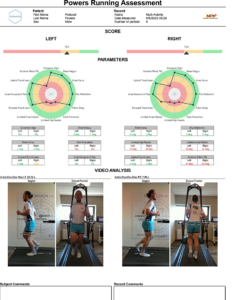Developed in partnership with Dr. Chris Powers, the Powers Running Assessment add-on provides users with a user-friendly method for analyzing running biomechanics, using Dr. Powers’ running assessment protocols.
About Dr. Chris Powers
Dr. Chris Powers, the founder of the Movement Performance Institute, is a leading expert in biomechanics and movement analysis. With a wealth of experience and a strong foundation in research, Dr. Powers has developed methodologies that focus on optimizing human movement to enhance performance and reduce injury risk. His innovative approaches have influenced countless practitioners in the field, and the Powers Running Assessment is a testament to his commitment to advancing running biomechanics.

What is the Powers Running Assessment?
The Powers Running Assessment represents a significant advancement in the realm of running biomechanics. It allows practitioners to evaluate movement patterns using either:
-
2D Markerless Video – a camera-based workflow that captures 2D mechanics without the need for physical markers or sensors
-
Ultium Motion 3D Motion Capture – an IMU sensor-based workflow that collects 3D kinematic data
Both options mirror Dr. Powers’ established methodology and generate clear, actionable reports featuring an overall risk score and color-coded parameters based on clinical criteria.
Key Features of the Powers Running Assessment:
-
Flexible Capture Options: Choose between 2D Markerless video or Ultium Motion IMUs depending on your lab setup or use case.
-
Event-Based Scoring: Automatically extract and score key gait events such as initial contact and peak knee flexion.
-
Data-Driven Insights: Evaluate metrics like stride length, cadence, and overall efficiency to guide interventions.
-
Visual & Interactive Reporting: Deliver impactful assessments through color-coded visuals and easy-to-understand feedback.
Integrating the Powers Running Assessment into your practice can enhance your ability to support runners of all levels. By identifying biomechanical discrepancies and providing data-driven recommendations, practitioners can not only improve performance but also help reduce the risk of injury. This approach fosters a deeper understanding of each runner’s unique mechanics, leading to more personalized and effective training strategies.
Watch to learn more about Dr. Chris Powers’ philosophy and the Powers Running Assessment workflow.


